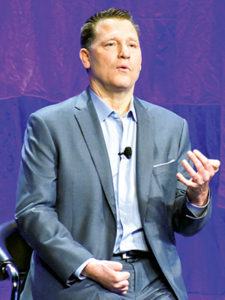
In the prime of his life and after years of healthy living and exercise, Jonathan Koch found himself on the brink of death and in the care of a rheumatologist. During Saturday’s Opening Lecture & Awards session, Koch shared his experience in surviving the rare immune disorder acute hemophagocytic lymphohistiocytosis and shared an impassioned message for how physicians can better partner with patients to enhance survival potential.
“For those of us who have been struck down and those of you who have dedicated your lives to helping us, there’s more there. There’s a way in which you can relate to your patients, and your patients can relate to you, that says you’re partners in this,” said Koch, who is president and the chief content officer of Asylum Entertainment.
In January 2015 at a conference in Washington, DC, Koch experienced debilitating symptoms that sent him to George Washington University Hospital, where doctors told him to call his loved ones because he probably was going to die that night.
“My daughter was 15 at the time, and I decided not to call her,” he said. “And I also decided at that moment that I couldn’t die. I would fight for her to stay alive. The ability to fight for the people that you love and care about is so much more powerful than if you just fight for yourself.”
Doctors placed him in a medically induced coma, where he experienced vivid terrors of torture. He described the feeling of being attacked by poisonous snakes and recovering a bit less after each episode. At the point he felt he had “11 breaths left,” he heard a voice asking whether he wanted to keep doing what he was doing.
“Of course my answer was no, who would want to keep doing that?” he said. “But the voice understood that I didn’t really know what he meant. And he said, ‘If you choose to survive, it’ll be the hardest, most brutal fight of your life every day for the rest of your life.’ ”
Despite the promise of a difficult fight ahead, he awoke to discover he’d been in the coma for three weeks. He embraced his new reality — necrotic hands and feet, a 50-pound weight loss and no awareness of what had happened to him — with a fervor that baffled his physicians.
“My life has always been lived by dealing with things straight on. It is what it is. I’ve heard it a million times in my life, but it’s true. It is what it is, and the damage that people do to themselves has to do with the way that they react to what’s going on in their lives way more so than the very real things that are going on,” he said.
His positive attitude led his doctors to believe he didn’t understand what was happening to him. However, he explained that his approach — a strong desire to get better and laugh with his wife, live for his family, and return to an active life — was vital to his recovery.
“I think that when I’ve interacted with all the medical professionals, it was important for me to tell them that I wanted to fight and not just to say it, but for them to believe it and for them to feel the same way about me that I feel about them, which is thankful and grateful that they are there, that they care enough to help me and help our family,” he said.
That partnership between Koch and his medical team fueled his recovery, including his pathway to a hand transplant. He noted that it was important to him to fight for survival and recovery, not just for himself, but to give his medical team a victory.
“I’m here to share with you this idea that the people that you are treating, the people that count on you, there is more in them than you know. There is more capacity for them to fight by your side,” he said. “What’s important is that you know what your patients need, that you understand their minds as much as you understand what’s wrong with them, that you can give them the opportunity to see that this isn’t just an appointment that you expect from them, that they will fight.”
